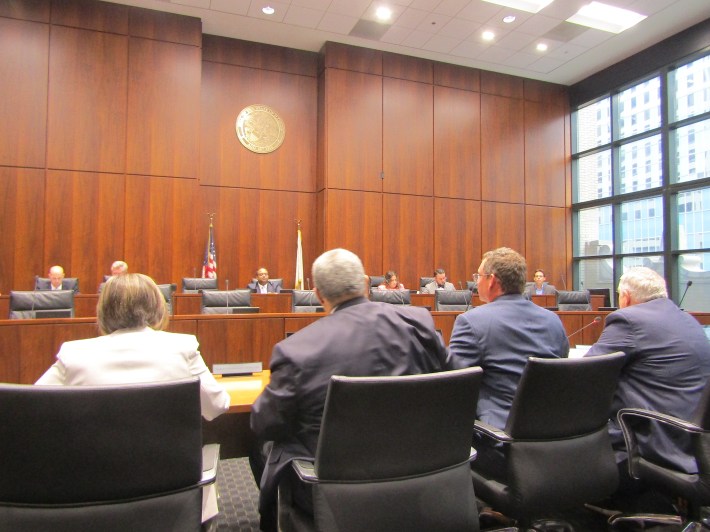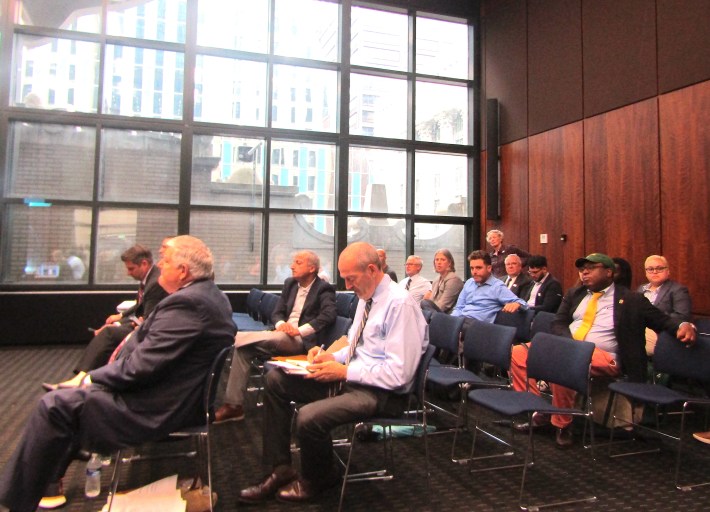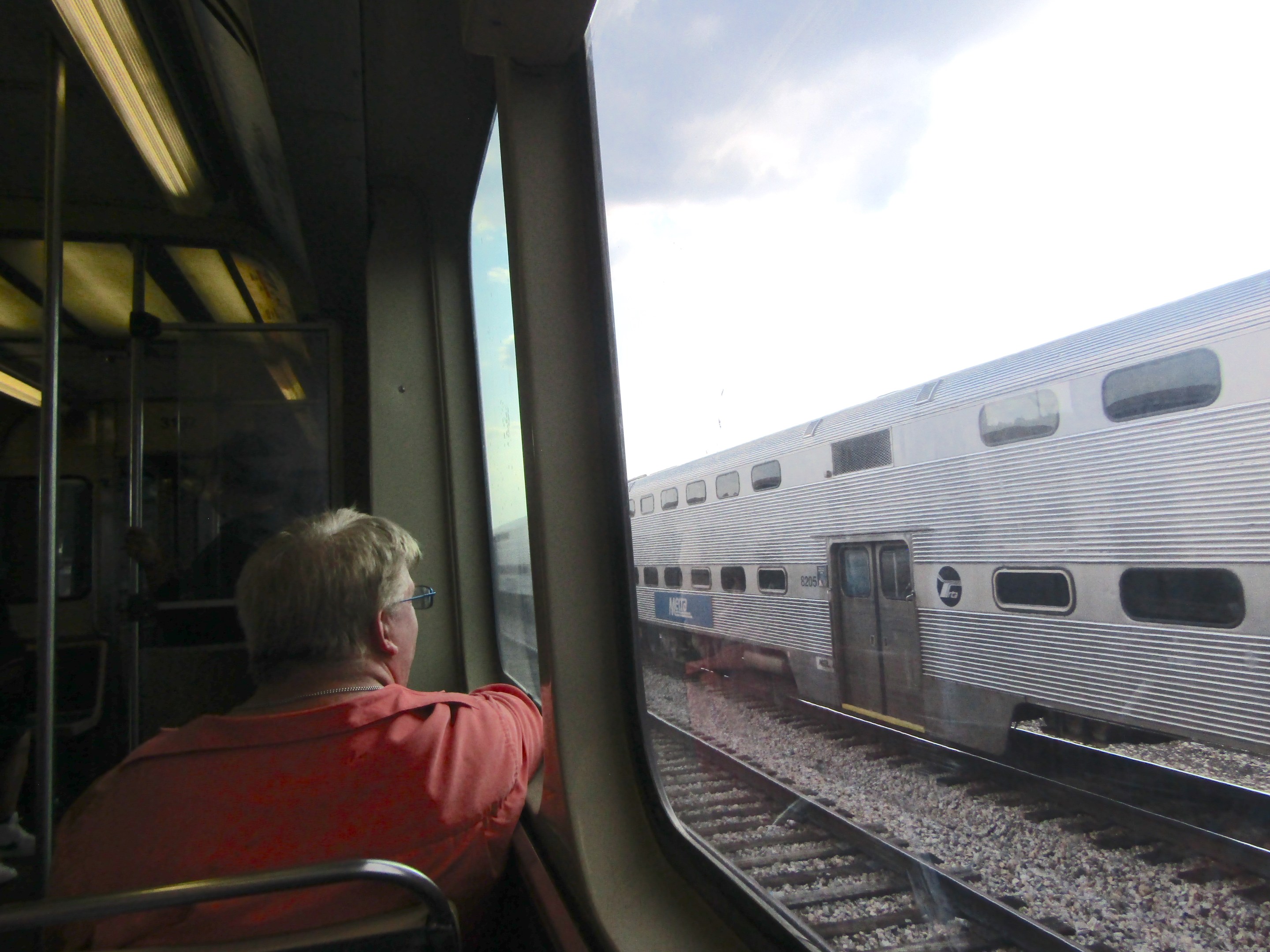
On Tuesday morning, the Illinois Senate Transportation Committee held its first hearing on what could be Chicagoland’s biggest public transportation restructuring since the 1983 reorganization that created Metra and Pace. At yesterday's meeting, transit officials argued for preserving the current, complex four-agency structure, while the heads of local chambers of commerce voiced support for combining them into a single transit agency.
The CTA, Metra and Pace are running out of road and track, so to speak, approaching a $730 million fiscal cliff once their federal COVID stimulus funds run out in 2026. Transportation committee chair State Sen. Ram Villivalam (D-8th) and Illinois State Rep. Eva-Dina Delgado (D-3rd) filed a bill that would do away with the current structure. The three transit service boards operate independently, with the Regional Transportation Authority providing oversight, signing off on their budgets, divvying up some federal funds, and helping with planning. Villivalam and Delgado’s legislation would replace all that with a single agency dubbed the Metropolitan Mobility Authority.
The transportation committee is holding six public hearings on the matter, and Villivalam told reporters that the committee plans to hold evening town halls to gather additional input. The goal, he said, is to have a refined version of the bill ready by early 2025. That way, any reform would pass before prerecorded 'L' car announcements need to be changed to, "Now approaching a $730 million transit fiscal cliff."

The hearing, which was held at the Loop’s Bilandic Building, 160 N. La Salle St. on the morning of July 9, lasted for almost four hours. Hopefully there was no symbolism to the fact Michael Bilandic was the Chicago mayor who lost reelection after he failed to adequately respond to the 1979 Chicago blizzard, which included massive transit delays.
At the meeting, transit executives argued that new funding is vital to continue to rebuilding ridership in the post-pandemic era. They maintained that the RTA provides a necessary layer of oversight. And they insisted that the current structure, including four agency heads and 47 total board members, ensures that the communities that each system serves are properly represented.
But the heads of the Chicagoland and Illinois chambers of commerce argued that the state shouldn’t give transit any more money until there is fundamental reform. They said that would include some form of consolidation.
The Transit execs’ positions
The RTA board has a three-way balance between directors representing the city of Chicago, suburban Cook County, and the collar counties. The CTA board is made up of four members appointed by the Chicago mayor, and three appointed by the Illinois governor. The Metra and Pace boards are mostly balanced between the collar county and suburban Cook County appointees – The Chicago mayor only appoints one member.

The Metropolitan Mobility Authority board would have similarities to the RTA board, except that Cook County commissioners wouldn’t appoint any directors. CTA president Dorval Carter argued that the current setup makes sense for his board, since "90 percent of the riders of the CTA live in the City of Chicago... The mayor of Chicago [Brandon Johnson] believes that he’s responsible for public transportation," he said.
Pace executive director Melinda Metzger said that she doesn’t believe combining the four agencies into one organization would improve transit. "We all have board members who are local, who understand the local needs and they can give us a lot of input,” she said.
A recent incident undermines Metzger's claim that having four different boards makes it more likely that area residents will get representatives who understand local transit issues. In April, Mayor Johnson nominated politically connected West Side pastor Ira Acree for the RTA board. After Acree admitted he rarely rode transit and was unfamiliar with the fiscal cliff issue, he got pushback from transit advocates and alders, and eventually withdrew his name.
However, no one at Tuesday's meeting mentioned the role that political clout can play in who gets tapped to be one of the dozens of current Chicagoland transit board members. They each get paid between $10,000 and $25,000 annually to attend a dozen meetings.
On the other hand, in contrast to the more liberal rules governing Chicago's RTA board nominations, Metzger noted that suburban Pace board members are legally required to be current or former mayors of local municipalities. That makes it much more likely they will actually know something about transit.
Metra CEO Jim Derwinski also testified against consolidating the agencies. He said he was worried that, under a single board, the needs of the collar counties and suburban Cook County "would get minimized." Derwinski didn't explain exactly why it wouldn't be possible for the suburban representation on the new single MMA board to be proportionate to the current total 'burbs representation on the four existing boards.
For his part, RTA board chair Kirk Dillard argued that the current agency structure separates financial and planning oversight from daily operations for a reason. He said the RTA uses its powers to push the service boards to keep costs down. "The RTA does help hold those folks accountable, and if you let the operations people determine the budget, they’re going to want to spend," he said.
All four officials argued that collaboration between the four agencies isn’t the problem – it's a lack of funding. They said the key to rebuilding ridership is having more frequent and regular service, especially during off-peak hours, evenings and weekends. The transit systems have already been moving in that direction, but money is needed to keep the momentum going.
"You have to keep funding us and allow us to achieve that," Carter said. "We’ve seen in other cities like Toronto, where they made investment in increasing frequency, they’ve seen dramatic increases in revenue."
"We have to think bolder, much bolder, and the key to this more funding,” Derwinski said. "Frequency and [affordable fares] – that’s how you get [ridership and] revenue."
"The suburban market has pent-up demand for transit service, which warrants transformational expansion in transit funding, which will support economic growth," Metzger said. "I ask you to imagine how much better coverage and service flexibility would be for your constituents if Pace received adequate funding."
The proposed state legislation for combining the four agencies would also provide an additional $1.5 billion in transit funding.

The four officials did acknowledge that some reform is needed. All agreed that the current requirement that at least half of transit revenue must come from fares is outdated. Dillard said that having RTA set regional fares, "consolidating similar job functions” to streamline regional service, and creating a more regionally balanced distribution of board seats, were all ideas worth exploring.
The Business Community View
Illinois Chamber of Commerce president Lou Sandoval and Chicagoland Chamber of Commerce CEO Jack Levin both said that transit is important for their members, because it allows many employees to get to work. But they both also criticized the CTA for current safety and cleanliness issues, and they both advocated for a unified transit authority where riders can seamlessly transfer between all lines.
Levin also said that, while he understood that some tax and/or fee increase was inevitable, he wants to see "greater cost savings" because "taxpayers deserve nothing less." And he argued transit agency consolidation should be required before the systems get additional funding.
Levin told reporters he would like to see "reforms before revenue," adding that the consolidation doesn’t have to be exactly like what the MMA bill is proposing. "Governance is an important issue, and we need a centralized [structure]," he said.
Sen. Ram Villivalam told the reporters after the meeting that, while he understood the transit officials’ concerns, "in terms of governance, we need to continue to have a robust conversation" to create a change that "would lead to transparency and accountability" and "supports our economy."
Sen. Villivalam added that he was looking forward to the future hearings and town halls, because he wanted to make sure every part of the region has a chance to be heard.
Some Breaking News
The long meeting included a couple of transit announcements.
Derwinski said that thanks to an agreement with Canadian National Railway, Metra will be able to run North Central Service trains from O'Hare to Chicago Union Station during the upcoming Democratic National Convention. He explained that ten days was the most the Canuck railroad would agree to without some major infrastructure investments.
Carter said that he expects the CTA to have enough operators to restore bus service to pre-pandemic levels by the end of this summer, and 'L' service to pre-COVID numbers by the end of this year. He also mentioned that the CTA is planning a longterm project to revise its bus route system, similar to what Pace is already working on. The CTA expects to start community outreach next month.
Thanks to Twitter users Midwest Elitist, Recalibrate & Destroy, and baileysanz.bsky.social for suggesting new ways to describe the transit agencies' looming fiscal woes. – John Greenfield, editor

Did you appreciate this post? Please consider making a tax-deductible donation, to help keep Streetsblog Chicago's sustainable transportation news and advocacy articles paywall-free.





